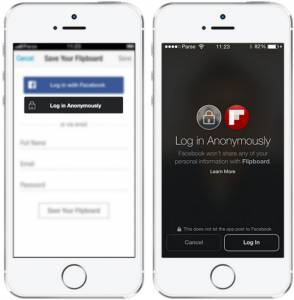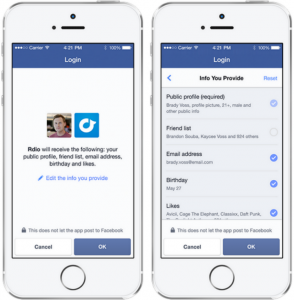
Facebook held its f8 Developers Conference last week for the first time since 2011. One announcement from the conference that has generated a fair amount of conversation is Facebook’s intent to offer an “Anonymous Login” option.
The announcement actually mentioned three features related to user privacy: Anonymous Login, a new version of Facebook Login, and a centralized control panel for app management. Each of these features is designed to grant users more control over the personal information that can potentially be passed to third-party apps. Understanding how these features work will help you make more informed privacy-related decisions.
Previous Single Sign On Process
Over the past few years, we’ve grown accustomed to using Facebook’s single sign on option to access accounts on third-party sites. In fact, according to Facebook, users logged into apps and websites more than 10 billion times in 2013 using their Facebook username and password.
Signing in to third-party apps with credentials from an existing Facebook account does have the benefit of simplifying the user experience and potentially increasing user engagement. For example, you don’t have to deal with the hassle of creating a new account or remembering an additional username and password. In some cases, it also makes it easier to take advantage of the social components of the app.
However, in exchange for the convenience of Facebook’s single sign on functionality, you are asked to allow certain personal information to pass to the third-party app you are accessing. This information generally includes your name, gender, username, account number, cover photo, and any other details you designate as “public ” in your Facebook profile.
Under previous practices, you were essentially given the choice to accept this information transfer or not use the app. If the app is created by a well-known and trusted source, passing your personal information may not be cause for concern. But if you’re mildly interested in experimenting with a new app and unfamiliar with the app developer, being forced to pass personal information to the third-party company can be a major deterrent for users sensitive to privacy.
Anonymous Login and the new Facebook Login are specifically designed to eliminate the apprehension associated with giving up personal information, and should help users feel more comfortable downloading and experimenting with third-party apps.
Anonymous Login
Facebook describes Anonymous Login as “An easy way for people to try an app without sharing any of their personal information from Facebook.” The feature is currently being tested by a few developers, but Facebook expects to roll it out to a broader audience in the coming months.
Using Anonymous Login, you’ll be able to log in to a third-party app using your Facebook credentials, but unlike the previous single sign on process, you are not required to share any of your personal information with the third-party app.
The Anonymous Login button will be featured in black, clearly distinguished from the trademark Facebook blue. Facebook provided an example of what the login experience will look like:
After you get more comfortable with the new app, you’ll have the option to share more information with the third-party provider if you’d like.
Facebook Login (New Version)
The new version of Facebook Login also includes functionality to help users control which information is passed to third-party apps. Unlike Anonymous Login which passes no information to third-party apps, the new Facebook Login enables users to specify which information is acceptable to pass to third parties.
For example, you might test a new app and determine it’s acceptable for your email to be passed along to the third-party, but prohibit access to your Friend list. Facebook provided an example of what this interface will look like, and as you can see, you can control specific permission with a few simple taps.
The new control panel will give users the ability to view and modify permissions associated with each app – and even completely remove apps if desired – all from one central interface, minimizing the effort it takes to manage numerous apps.
Implications For Users
The functionality provided by Anonymous Login and the new version of Facebook Login offer a lot of value to users concerned with privacy. Using these logins will allow you to bypass the hassle of creating new accounts with every app you use, and give you the freedom to test more apps without worrying about how your data is being used.
One factor of Anonymous Login worth recognizing is that the feature does not make you absolutely anonymous. Although it’s not a perfect metaphor, one way you might think about the anonymity provided by Anonymous Login is to compare it to using Incognito mode in Google Chrome. Going Incognito in Chrome allows you to browse the Internet without recording your web history – giving you the perception of anonymity – but Google still sees the terms you search and the pages you visit. Similarly, Anonymous Login enables you to access third-party apps without passing any personal information – making you anonymous to third-party apps – but Facebook still sees the apps you download and how you use them.
Depending on your personal preferences, the absence of true anonymity may or may not bother you – it is simply a factor to consider as you use the new feature.
What This Means For App Developers
Facebook is confident that Anonymous Login and the new Facebook Login will encourage users to experiment with more apps. An increase in users is obviously a benefit for app developers.
However, if you are a developer, you likely have some work to do. To begin with, developers are going to have to work harder to gain the trust of users and earn the data they were previously given. In many cases, these new changes will require more user education and increased data transparency from app providers.
In addition, as part of Facebook’s changes to login, all apps must now undergo a Login review as part of the app-review process.
The review is based on the following criteria:
- Does the app request only the permissions it needs?
- Does the app clearly ask for permission to post on the user’s account?
- Does the login work on a variety of devices without crashing or throwing errors?
These new requirements are effective immediately for all new apps, but existing apps will have up to a year to make any necessary changes.
Do you plan on using Anonymous Login or the new Facebook Login? Are you a developer faced with making upgrades to your app? How do you feel about these changes?
Let us know in the comments below.
Author
Becky is the Senior Content Marketing Manager at TUNE. Before TUNE, she handled content strategy and marketing communications at several tech startups in the Bay Area. Becky received her bachelor's degree in English from Wake Forest University. After a decade in San Francisco and Seattle, she has returned home to Charleston, SC, where you can find her strolling through Hampton Park with her pup and enjoying the simple things in life.






Leave a Reply
You must be logged in to post a comment.